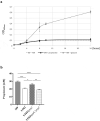Propionate catabolism by CD-associated adherent-invasive E. coli counteracts its anti-inflammatory effect
- PMID: 33769191
- PMCID: PMC8007151
- DOI: 10.1080/19490976.2020.1839318
Propionate catabolism by CD-associated adherent-invasive E. coli counteracts its anti-inflammatory effect
Abstract
Crohn's disease (CD) is a chronic and disabling inflammatory disorder of the gut that is profoundly influenced by intestinal microbiota composition, host genetics and environmental factors. Several groups worldwide have described an imbalance of the gut microbiome composition, called dysbiosis, in CD patients, with an increase in Proteobacteria and Bacteroidetes and a decrease in Firmicutes. A high prevalence of adherent-invasive Escherichia coli (AIEC) pathobionts has been identified in the intestinal mucosa of CD patients. A significant loss in the bacteria that produce short-chain fatty acids (SCFAs) with anti-inflammatory properties, such as propionate, is also a consequence of dysbiosis in CD patients. Here, the AIEC reference strain LF82 was able to degrade propionate in the gut, which was sufficient to counteract the anti-inflammatory effect of propionate both in in vitro models and in mice with DSS-induced colitis. The consumption of propionate by AIEC pathobionts leads to an increase in TNF-α production by macrophages upon infection through the bacterial methyl-citrate pathway. To induce the protective effects of SCFAs on the inflamed gut, we used a G-protein-coupled receptor 43 agonist (GPR43 agonist) that is not metabolizable by intestinal bacteria. Interestingly, this agonist showed anti-inflammatory properties and decreased the severity of colitis in AIEC-infected mice, as assessed by an improvement in the disease activity index (DAI) and a decrease in AIEC pathobiont encroachment. Taken together, these results highlight the effectiveness of GPR43 agonist treatment in the control of gut inflammation and improved our understanding of the ability of AIEC to modulate propionate availability to create an infectious niche to its advantage.
Keywords: Crohn’s disease; GPR43 agonist treatment; adherent-invasive E. coli; methyl-citrate pathway; propionate.
Figures







Similar articles
-
Western diet induces a shift in microbiota composition enhancing susceptibility to Adherent-Invasive E. coli infection and intestinal inflammation.Sci Rep. 2016 Jan 8;6:19032. doi: 10.1038/srep19032. Sci Rep. 2016. PMID: 26742586 Free PMC article.
-
Association of Adherent-invasive Escherichia coli with severe Gut Mucosal dysbiosis in Hong Kong Chinese population with Crohn's disease.Gut Microbes. 2021 Jan-Dec;13(1):1994833. doi: 10.1080/19490976.2021.1994833. Gut Microbes. 2021. PMID: 34812117 Free PMC article.
-
Development of Heptylmannoside-Based Glycoconjugate Antiadhesive Compounds against Adherent-Invasive Escherichia coli Bacteria Associated with Crohn's Disease.mBio. 2015 Nov 17;6(6):e01298-15. doi: 10.1128/mBio.01298-15. mBio. 2015. PMID: 26578673 Free PMC article.
-
Prevalence of the pathobiont adherent-invasive Escherichia coli and inflammatory bowel disease: a systematic review and meta-analysis.J Gastroenterol Hepatol. 2021 Apr;36(4):852-863. doi: 10.1111/jgh.15260. Epub 2020 Sep 28. J Gastroenterol Hepatol. 2021. PMID: 32929762
-
Pathogens in Crohn's Disease: The Role of Adherent Invasive Escherichia coli.Crit Rev Eukaryot Gene Expr. 2024;34(3):83-99. doi: 10.1615/CritRevEukaryotGeneExpr.2023050088. Crit Rev Eukaryot Gene Expr. 2024. PMID: 38305291 Review.
Cited by
-
Porphyromonas gingivalis aggravates colitis via a gut microbiota-linoleic acid metabolism-Th17/Treg cell balance axis.Nat Commun. 2024 Feb 22;15(1):1617. doi: 10.1038/s41467-024-45473-y. Nat Commun. 2024. PMID: 38388542 Free PMC article.
-
Microbiome multi-omics analysis reveals novel biomarkers and mechanisms linked with CD etiopathology.Biomark Res. 2025 Jun 16;13(1):85. doi: 10.1186/s40364-025-00802-1. Biomark Res. 2025. PMID: 40524271 Free PMC article.
-
The Critical Role of Acyl Hydrocarbon Receptor on the Combined Benefits of Postbiotic Propionate on Active Vitamin D3-Orchestrated Innate Immunity in Salmonella Colitis.Biomedicines. 2023 Jan 12;11(1):195. doi: 10.3390/biomedicines11010195. Biomedicines. 2023. PMID: 36672703 Free PMC article.
-
Successful allogeneic fecal microbiota transplantation for severe diversion colitis: a case report.J Int Med Res. 2024 May;52(5):3000605241241000. doi: 10.1177/03000605241241000. J Int Med Res. 2024. PMID: 38749910 Free PMC article.
-
Different Dose of Sucrose Consumption Divergently Influences Gut Microbiota and PPAR-γ/MAPK/NF-κB Pathway in DSS-Induced Colitis Mice.Nutrients. 2022 Jul 4;14(13):2765. doi: 10.3390/nu14132765. Nutrients. 2022. PMID: 35807944 Free PMC article.
References
-
- D’Argenio G, Mazzacca G. Short-chain fatty acid in the human colon. Relation to inflammatory bowel diseases and colon cancer. Adv Exp Med Biol. 1999;472:149–158. - PubMed
-
- Huang N, Wu GD. Short chain fatty acids inhibit the expression of the neutrophil chemoattractant, interleukin 8, in the Caco-2 intestinal cell line. Adv Exp Med Biol. 1997;427:145–153. - PubMed
Publication types
MeSH terms
Substances
LinkOut - more resources
Full Text Sources
Other Literature Sources
Medical
